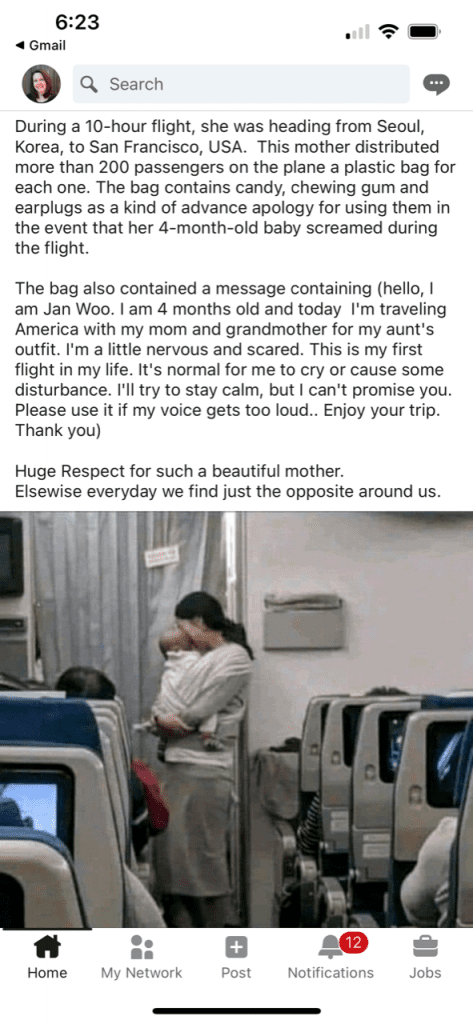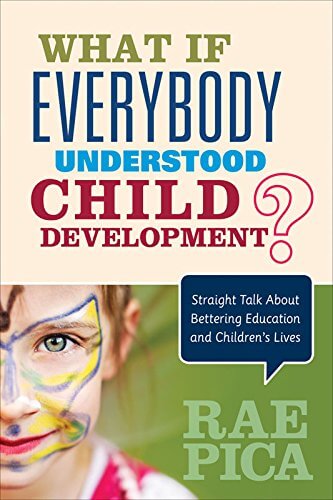Sneak peek: Do we need to apologize for children’s developmentally appropriate behavior? Thoughts on fostering a culture where children can thrive.
You’ve probably seen posts like this before on social media. The one where the parent (almost always the mother) prefaces the flight with preemptive apologies for her children’s behavior—loudness, crying, erratic behavior, etc. (AKA developmentally appropriate behavior for an infant or toddler). At first, I thought it was just another cute post on social media. And then I thought about it more.

This is a mom of a four-month-old. I imagine she is incredibly stressed to be traveling long distances with an infant in the first place. Why, in our society, does she feel pressured to preemptively apologize for her infant’s behavior? An infant is an infant. They cry; they get uncomfortable; they get hungry. This is what babies do. The same could be said for toddlers. Toddlers have immature brains that aren’t yet fully developed. They kick the back of the seat; they can be loud and squirmy. That’s what toddlers do. These actions are all developmentally appropriate behavior for their ages. Yes, we should hopefully try to model and teach our children polite ways to behave in public. Of course, we can begin to do that even in toddlerhood. But they are children. Children behave like children.
I think the real issue here is not children acting like children, but adults not acting like adults. As adults, we have mature brains. We have hopefully developed the ability to regulate our emotions and control our behavior. Children have not. They are still a work in progress.
So why is it in our society that we are expecting children to act better than adults often do? We’ve also seen videos on social media of adults throwing tantrums on planes, assaulting flight attendants, cursing passengers or having to be removed from planes because they can’t control themselves.
This really brought up an issue for me that I would describe as the “developmental double standard.” We oftentimes expect better behavior from children than we see from adults. If we really want our children to behave well in public and be able to regulate their emotions, then we as adults have to be willing to do the same. We’re the model for them.
That’s not to say that we always get it right. But we shouldn’t expect kids to always get it right either. This reminds me of one of my all-time favorite parenting books entitled, What If Everyone Understood Child Development? I think this is where the breakdown occurs—we (as a society) don’t understand child development.

If we really did, we wouldn’t be expecting parents, especially mothers, to apologize for the behavior of their children who are just being children. What if children could go through the world with developmentally appropriate expectations on the part of adults? What if everyone knew that toddlers can’t sit still on an airplane? What if everyone knew that babies cry often? What if everyone knew that even teenagers have trouble making good decisions because their prefrontal cortex is not fully developed? I think so many things would look different if everyone understood child development. This once again shows why I started this blog. These issues aren’t just to be relegated to a child development textbook or an academic journal. The implications of what we understand about child development have real-world consequences.
So if you are reading this, I urge you to spread the word about what you know about child development to someone who might not. It doesn’t need to come from a place of arrogance or conflict. Let’s foster an environment in our society where children are allowed to be children. A place where they are not judged for their behavior at four months old. A society where parents are not expected to control every aspect of their children’s behavior, even in infancy.
Related reading: Age or Developmentally Appropriate Expectations for Children’s Behavior
The status quo is not the world where children can thrive. A world where children can thrive means being surrounded by adults who understand their needs and their typical expected behavior as children. While I understand why this mom made this pre-emptive apology on the airplane, I hope we can create a world where no parent has to ever do that again.



Meghna
Hey Hi Amy, I couldn’t agree more with your approach. As a parent it is our responsibility to provide supportive environment to our children. And when society starts to accept the age appropriate behavior of any child without being judged , people will enjoy it .